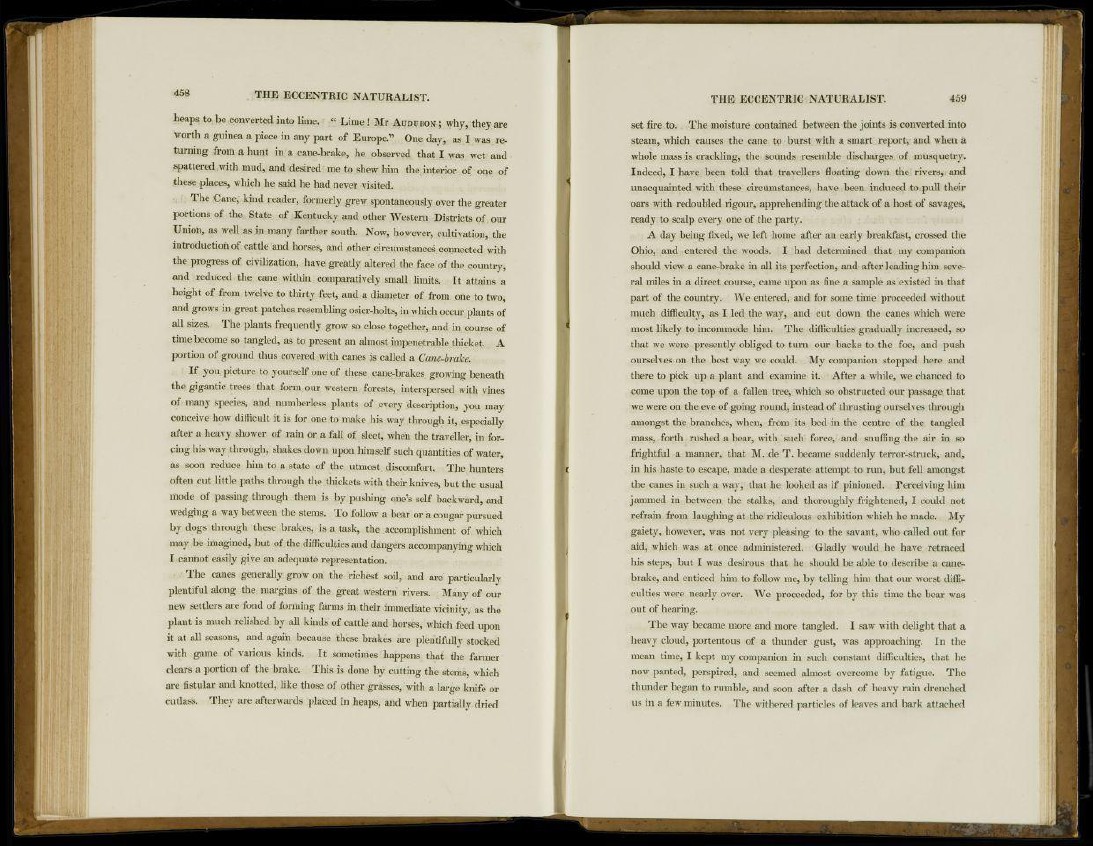
458 T H E ECCENTRIC NATURALIST.
heaps to be converted into lime. " Lime ! Mr AUDU BON ; why, they are
worth a guinea a piece in any part of Europe.1' One day, as I was returning
from a hunt in a cane-brake, he observed that I was wet and
spattered with mud, and desired me to shew him the interior of one of
these places, which he said he had never visited.
The Cane, kind reader, formerly grew spontaneously over the greater
portions of the State of Kentucky and other Western Districts of our
Union, as well as in many farther south. Now, however, cultivation, the
introduction of cattle and horses, and other circumstances connected with
the progress of civilization, have greatly altered the face of the country,
and reduced the cane within comparatively small limits. It attains a
height of from twelve to thirty feet, and a diameter of from one to two,
and grows in great patches resembling osier-holts, in which occur plants of
all sizes. The plants frequently grow so close together, and in course of
time become so tangled, as to present an almost impenetrable thicket. A
portion of ground thus covered with canes is called a Cane-brake.
If you picture to yourself one of these cane-brakes growing beneath
the gigantic trees that form our western forests, interspersed with vines
of many species, and numberless plants of every description, you may
conceive how difficult it is for one to make his way through it, especially
after a heavy shower of rain or a fall of sleet, when the traveller, in forcing
his way through, shakes down upon himself such quantities of water,
as soon reduce him to a state of the utmost discomfort. The hunters
often cut little paths through the thickets with their knives, but the usual
mode of passing through them is by pushing one's self backward, and
wedging a way between the stems. To follow a bear or a cougar pursued
by dogs through these brakes, is a task, the accomplishment of which
may be imagined, but of the difficulties and dangers accompanying which
I cannot easily give an adequate representation.
The canes generally grow on the richest soil, and are particularly
plentiful along the margins of the great western rivers. Many of our
new settlers are fond of forming farms in their immediate vicinity, as the
plant is much relished by all kinds of cattle and horses, whicli feed upon
it at all seasons, and again because these brakes are plentifully stocked
with game of various kinds. It sometimes happens that the farmer
clears a portion of the brake. This is done by cutting the stems, which
are fistular and knotted, like those of other grasses, with a large knife or
cutlass. They are afterwards placed in heaps, and when partially dried
T H E ECCENTRIC N A T U R A L I S T . 459
set fire to. The moisture contained between the joints is converted into
steam, which causes the cane to burst with a smart report, and when a
whole mass is crackling, the sounds resemble discharges of musquetry.
Indeed, I have been told that travellers floating down the rivers, and
unacquainted with these circumstances, have been induced to.pull their
oars with redoubled rigour, apprehending the attack of a host of savages,
ready to scalp every one of the party.
A day being fixed, we left home after an early breakfast, crossed the
Ohio, and entered the woods. I had determined that my companion
should view a cane-brake in all its perfection, and after leading him several
miles in a direct course, came upon as fine a sample as existed in that
part of the country. We entered, and for some time proceeded without
much difficulty, as I led the way, and cut down the canes which were
most likely to incommode him. The difficulties gradually increased, so
that we were presently obliged to turn our backs to the foe, and push
ourselves on the best way we could. My companion stopped here and
there to pick up a plant and examine it. After a while, we chanced to
come upon the top of a fallen tree, which so obstructed our passage that
we were on the eve of going round, instead of thrusting ourselves through
amongst the branches, when, from its bed in the centre of the tangled
mass, forth rushed a bear, with such force, and snuffing the air in so
frightful a manner, that M. de T. became suddenly terror-struck, and,
in his haste to escape, made a desperate attempt to run, but fell amongst
the canes in such a way, that he looked as if pinioned. Perceiving him
jammed in between the stalks, and thoroughly frightened, I could not
refrain from laughing at the ridiculous exhibition which he made. My
gaiety, however, was not very pleasing to the savant, who called out for
aid, which was at once administered. Gladly would he have retraced
his steps, but I was desirous that he should be able to describe a canebrake,
and enticed him to follow me, by telling him that our worst difficulties
were nearly over. We proceeded, for by this time the bear was
out of hearing.
The way became more and more tangled. I saw with delight that a
heavy cloud, portentous of a thunder gust, was approaching. In the
mean time, I kept my companion in such constant difficulties, that he
now panted, perspired, and seemed almost overcome by fatigue. The
thunder began to rumble, and soon after a dash of heavy rain drenched
us in a few minutes. The withered particles of leaves and bark attached